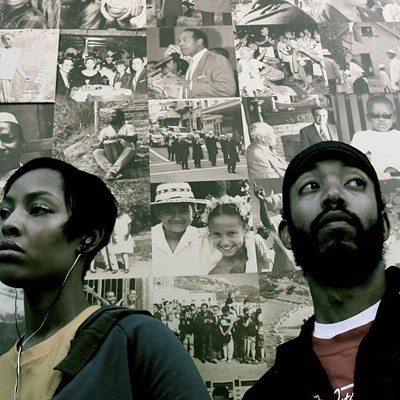That might well be the assumption of prejudiced rock fans who perceive any music without lyrics and vocals--anything purely instrumental, no matter how cool and innovative, no matter how inviting to alternative listeners--as the result of a loose jam. No words, huh? Must be a lazy lark between "real" gigs.
Not so with the 10-year-old Chicago-based ensemble, said guitarist Jeff Parker, the only member of Tortoise with a significant jazz and improvisational background.
"It's not at all done with improvisation," says Parker during a recent telephone interview from his home in Chicago.
The material on Tortoise's recent fifth album, It's All Around You, was meticulously and collectively composed during months of open-ended sessions at drummer-keyboards player John McEntire's Soma Electronic Music Studios. The studio became a compositional tool for the band.
"Someone will introduce an idea to the band," Parker said. "It may be a short motif, or it could just be a couple of notes, maybe even a drum lick or a sample. They'll introduce it right there and suggest we try it out, and then everyone sits in with it and just starts adding things to it. It's really collaborative.
"Although one of us might come up with the original idea, everyone contributes to it in terms of the arrangements and the harmonic direction a song will take. It's a very democratic process."
When not working with Tortoise, Parker plays jazz--from melodic neo-bop to avant-garde, with a little ska and funk thrown in. He is a solo artist (his Like-Coping album is a must-have) and keeps busy sitting in with such artists as Ken Vandermark, Fred Anderson, the New Horizons Ensemble, Aesop Quartet and various permutations of the Chicago Underground project. In addition, Parker also is a member of the jazz-oriented Tortoise off-shoot, Isotope 217.
The other members of Tortoise have played with such bands as The Sea and Cake, Eleventh Dream Day, The Poster Children, Pullman, Brokeback, A Grape Dope and Tom Zé.
For Parker, Tortoise offers "more of a compositional outlet than an improvisational one. It's ultimately experimental. But at the same time you're experimenting, you're trying to create these concise songs, so it's important for your discipline as a musician."
Because Tortoise's sound is an instrumental one, the literal meanings behind the music are less important than the environments created, Parker said.
"Well, it mainly has to do with the kind of--I know this might sound vague--with the manipulation of space and time, or space and sound. The relationship in this music is between sound and space. Even though there are melodies, the music has an ambient quality, and we're all basically rhythm section players."
For many alternative-rock fans, Tortoise's recordings--most notably the revolutionary Millions Now Living Will Never Die, in 1996--represent a lung full of fresh air, originality manifest in the staid rock-band format, even if many of the music's elements are familiar. In the past, their sound has referenced the spaghetti Western soundtracks of Ennio Morricone; 1970s progressive rock; breezy Brazilian and Cuban rhythms; surf tunes, experimental electronic music and smooth easy-listening pop of the '60s; ambient compositions by Steve Reich and Phillip Glass; and the collage-mosaic technology of hip-hop, trip hop and DJ culture.
"In the past, I guess our influences were a lot more recognizable," Parker said. "Now, I think, as a band, we have finally come into our sound, where it can stand as-is and doesn't have to depend on its referentiality."
Tortoise soon will crawl into the Old Pueblo.
The band will play its first concert in Tucson Sunday night, June 6, at Club Congress. It's an enticing bill that also will feature Tucson's Calexico as co-headliner and hip-hop artist Beans (a member of Anti-Pop Consortium) as the opening act. The show will begin early and is an outdoor, all-ages affair. When it finishes at 11 p.m., the party moves inside for a free concert with Tucson's Nick Luca Trio.










